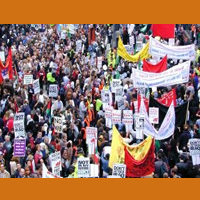TRANSFORMING ECONOMICS: CHALLENGES
Introspection: economists on their own science
A critical analysis of what one considers one’s own is a challenge for every person. Scientists should be receptive of sound arguments and facts, and be prepared to adapt their ideas and theories correspondingly. But in practice scientists are first and foremost people. They believe in certain theories that, according to them, represent reality best. And as all people they are strongly inclined to stick to their beliefs. This is done by ignoring or rejecting facts and opinions that undermine those beliefs while favoring opinions and facts consistent with them. That this human trait is characteristic also of scientists is shown by, among others, the well-known scientist and philosopher of science Thomas Kuhn.
Kuhn indicates that the above applies not only at individual level but also at group level. That makes proclaiming dissenting opinions a risky business. Especially when those opinions undermine the foundations of the faith. Generally scientists who express such opinions cannot look forward to a robust argument-based debate. Instead they face the risk of ostracism: being banned by the scientific community through an academic boycott. This usually takes the form of denying the deviant fellow-scientist the opportunity to express her or his views, however well reasoned and documented, in scientific publications such as peer-reviewed journals or in scientific conferences. And promotion, for example to a professorship, is out of the question.
The above appears to apply to economics even more than to other sciences. Economists are more inclined to hold on to their standard beliefs than any other professional group. This is all the more shocking taking into consideration the obvious failure of their science in what should be the proof of the pudding for any science: more or less accurate prediction.
Yet many economists make up for their lack of introspection and self-criticism in arrogance: in spite of its dismal performance (economics is known as “the dismal science”) no other profession is so dismissive of criticism from outsiders as well as insiders and, even more damaging, so self-confident in counseling governments, enterprises, shareholders and other institutions and groups on policy.
A key explanation of this discrepancy is that economists, especially those in the academy, focus insufficiently or not at all on what happens in the real world. Instead they create their own world and reality. A world that is orderly and harmonious, and can be captured in mathematical equations and models; a world that has nothing to do with our chaotic reality. Instead of testing the resulting theoretical insights against reality they refine their core theories ever further by elaborating, broadening and mathematically embellishing them.
A few critical economists have identified the above described approach as “blackboard economics”. This approach and its consequences are analyzed in Crisis, Economics and the Emperor’s Clothes. That analysis, in turn, is based on analyses of the few economists who have questioned the basic model and standard methodology of economics.
In addition to such critical economists – such as Paul Ormerrod and Deirdre McCloskey, and more recently Steve Keen – there is a growing movement formed mainly by economics students who have come to question academic education. Yet neither of these groups questions the foundations of their science. The aforementioned critical economists condemn the core theory of economics and the assumptions on which it is based: the theory of competitive equilibrium. They also criticize the huge amount of economic analysis that – simply put – assumes that relationships between economical variables are linear. But even such critical economists continue to be focused on making economics “hard” science by modeling economic reality mathematically. And as did the founders of modern mainstream economics they aim to improve economics by drawing inspiration from the natural sciences, notably physics and, increasingly, climatology and ecology.
The movement that advocates the renewal of economics education and research aims primarily for more diversity: those involved want to learn not only the neo-classical economics that has been dominant for decades but also want to be informed about other economic theories and approaches. But as the first category of critics this group also poses no questions about the foundations of their science, in particular the assumption of the existence of an economic system the properties of which are determined by universal, timeless laws that can be expressed in mathematical equations. This despite the fact that in the past even well-known economists have been critical of that belief and the resulting irrepressible need to model. This applies notably to John Maynard Keynes, by far the most influential economist from the 1920s up to the 1970s, and also to the lesser-known James Kenneth Galbraith. Their criticism has never made even the slightest dent in the standard economic approach to reality.
Galbraith is not even considered an economist: he is at most a “political economist”, very possibly the category of economist with the lowest academic status. Keynes, in spite of his influence on policy making, was academically encapsulated by his efforts to get his fellow economists to support his ideas and the corresponding policy measures he deemed necessary to overcome the Great Depression of the 1930s. As a result his more fundamental criticism of the economic method, particularly as regards the focus on mathematical modeling, was lost.
The movement that advocates the renewal of economic education and research wants more attention for, among others, Keynesian economics, but also for Marxist economy and behavioral economics. This latter, relatively new branch of economics studies decision-making by economic actors – and more often than not tries to express the resulting outcomes in mathematical equations and models. But the more basic question of whether mathematical modeling is the most appropriate way to fathom and represent economic reality is not stated.
Illustrative of the situation and state of mind of critical economists is what the (co-) founder of the Dutch organizations ONE (Our New Economy) and Rethinking Economics ((http://www.rethinkingeconomics.nl/) wrote in answer to the question whether Crisis, Economics and the Emperor’s Clothes could be included in the reading lists of these organizations (both organizations aim at renewing economic education and research to promote sustainable development). On my prompting that the book might be a bit “too far out there” she responded: “As you yourself indicate, the theme of the book is so far from the economic mainstream that it may be a bridge too far for many progressive economists. I think that observation is indeed correct. That is why I have chosen not to start with (in the first place) the foundations of economic science, but to limit myself to calling for more diversity (see appendix) and that already provokes resistance.
However this economist did indicate that another initiative in which she is involved, the Goudzwaard School of Economics, will have its own website to bring to the attention of a wider audience books such as Crisis, Economics and the Emperor’s Clothes, for example by a review note: see here the comments of Bob Goudzwaard, namesake of the School and emeritus professor of economics, on Crisis, Economics and the Emperor’s Clothes (for the present only in Dutch).
Challenges for innovators
The reactions of economists and of people who consider themselves economically literate on the proposals for monetary reform and on the books on this website give a good impression of the enormous challenges faced by those who want to innovate economics. These challenges can be summarized as follows:
- As noted above, the vast majority of progressive and / or critical economists and economics students who want to “innovate” economics are aiming primarily at more pluriformity in education and research, that is, more attention to other approaches than the now dominant neoclassical economics. That is still a far cry from real renewal. Positive though their critical attitude is this group has not even come close to a critical assessment of the fundamentals of their “science” and the deep-seated shortcomings therein. Much less has one drawn, from the failures of mainstream economics thus far, the conclusion that a new approach is needed: an effort to develop economics as a real science by re-establishing and rebuilding it as the social science it really is.
- The second challenge is formed by the huge barriers faced by really critical economists in questioning the foundations of their science among their less enlightened colleagues. If advocating more diversity and pluralism leads to resistance, a plea for the rebuilding of economic science will result in a fiercely negative response or, perhaps even worse, no response at all. Instead the person who makes the plea will be marginalized. The scientific ideal of a free and open discussion based on arguments is an ideal image that is rarely met even among scientists, and even less among economists.
- Current economics is, as this website indicates, not science but a belief with strong ideological aspects. The starting point is the market, with the central idea that market forces guarantee optimal efficiency and thus wealth creation. Although most economists do have an eye for so-called “market failures”, instances where government intervention is deemed necessary, the need for such interference is regarded as being the exception rather than the rule. And such instances do not make the slightest dent in the faith in markets. The dominant belief among economists remains that the market should be intervened with as little as possible, and vice versa that the role of government should be restricted as much as possible. There are considerable differences between economists about the extent of the “as much as possible”, that is, about the extent to which government intervention in markets is necessary to correct “market failure” or “market imperfections” (the use of one or the other term, “failure” or “imperfection”, is an indicator of the ideological conviction of the economist using it). But the belief that market forces and profit-oriented private enterprise are superior to any other form of production, at least in terms of efficiency and wealth creation, remains rock-solid. The booklet “The Primacy of Private“, discussed on this website and scheduled to become available as a download in the course of 2018, explores this theme further and discusses possible alternatives. Yet even raising the question whether there are alternatives for private, profit-oriented production that might be more in line with the public interest is anathema in economics. It is that boundless confidence in markets that gives current mainstream economics its ideological character.
In short: the challenges to the drastic reform of economics, so sorely needed, are enormous. But they will have to be met to overcome the huge obstacles that mainstream economics is currently putting in the path of sustainable development.



